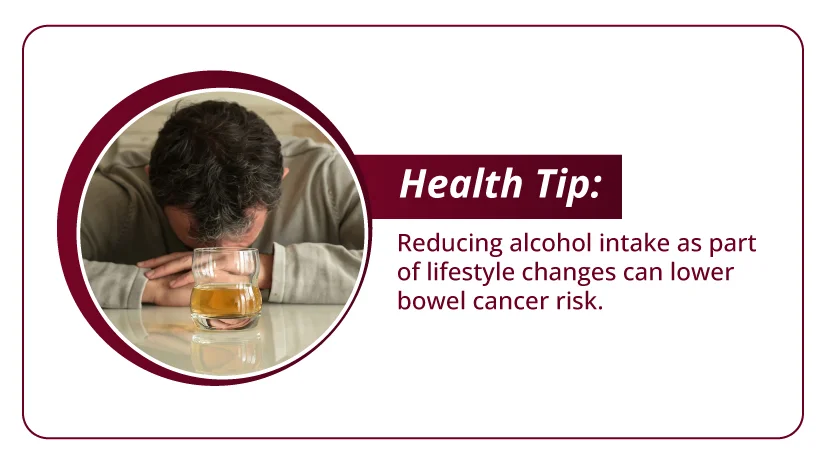
Alcohol’s Effect on Bowel Cancer
Bowel cancer, or colorectal cancer, commonly starts in the colon or rectum and is prevalent in the U.S. Early signs include bowel habit changes, blood in stools, and abdominal pain. Early detection through regular screening is essential. Lifestyle choices such as diet, exercise, and alcohol consumption impact its risk, with excessive alcohol increasing its likelihood. Reducing alcohol intake is vital to prevent higher risk.
Key Takeaways
Drinking alcohol raises the risk of bowel cancer by damaging DNA and disrupting cellular functions in the digestive system. Here’s what you need to know:
- Excessive alcohol intake is linked to a higher likelihood of developing bowel cancer.
- Reducing alcohol intake as part of lifestyle changes can lower bowel cancer risk.
- Regular screenings like colonoscopies can detect precancerous polyps early, preventing cancer.
Indiana Center for Recovery offers alcohol treatment for individuals facing addiction challenges, providing comprehensive support and care. For information, call us at (844) 650-0064.

Understanding Bowel Cancer
Bowel cancer, or colorectal cancer, is a severe health issue in the United States. This type of cancer affects the colon or rectum, parts of the large intestine. Early detection is vital to successful treatment. Lifestyle choices, including alcohol consumption, play a significant role in its development.
What Is Bowel Cancer?
Bowel cancer begins in the colon or rectum. These organs are part of the digestive system, helping to process waste. This type of cancer often starts as small growths called polyps. While not all polyps become cancerous, some do if left untreated.
Early signs include changes in bowel habits, such as diarrhea or constipation, and blood in the stool. Abdominal pain, unexplained weight loss, and fatigue are other warning signs. Regular screening, like colonoscopy, can detect polyps before they become cancerous.
Risk Factors For Bowel Cancer
Bowel cancer risk factors include age, most commonly over 50, family history, and lifestyle choices. High-risk factors are diets rich in red or processed meats, lack of exercise, obesity, cigarette smoking, and heavy alcohol consumption, which increases colorectal cancer risk. Eating more fruits, vegetables, and fiber and reducing alcohol can decrease the risk of different types of cancer.
The Role Of Alcohol In Health
Alcohol consumption significantly impacts health. While moderate drinking might have some social benefits, excessive alcohol use poses serious health risks. It affects multiple organs and increases the risk of various diseases.
General Health Impacts Of Alcohol
Alcohol affects many parts of the body. It can damage the liver, leading to conditions like fatty liver, hepatitis, cirrhosis, and liver cancer. Heavy drinking weakens the immune system, making infections more likely. It also increases the risk of several cancers, including cancer of the mouth, throat, bowel, breast, neck cancer and lung cancer.
Cardiovascular issues are another concern; excessive alcohol consumption raises blood pressure and can cause heart disease. Mental health is also at risk, with alcohol contributing to depression and anxiety.
Alcohol Consumption Patterns
Alcohol consumption varies significantly among individuals, from occasional use to heavy drinking. Binge drinking involves consuming large amounts of alcohol quickly, posing risks like alcohol poisoning. Chronic heavy drinking leads to serious health issues such as liver disease, heart problems, and cancer.
Factors like peer pressure, stress, and alcohol availability can influence drinking habits. It’s crucial to identify and address harmful drinking patterns to prevent and treat related health problems. Cutting down or quitting alcohol can significantly reduce health risks for the heavy binge drinker.
Research Linking Alcohol And Bowel Cancer
Extensive research links alcohol consumption to bowel cancer. Studies show that drinking alcohol increases the risk of developing this type of cancer. Researchers investigate how alcohol causes these effects and determine the level of risk associated with different amounts of alcohol.
Epidemiological Studies
Epidemiological studies examine the relationship between alcohol consumption and bowel cancer across large populations. These studies consistently find a higher incidence of bowel cancer among heavy drinkers compared to moderate drinkers or light drinkers. Data from these studies show that even moderate alcohol intake can increase bowel cancer risk. The risk rises with the amount of alcohol consumed. These findings underscore the importance of reducing alcohol consumption to lower bowel cancer risk.
Mechanisms Of Alcohol-Induced Carcinogenesis
Alcohol can cause cancer through several mechanisms. When the body metabolizes alcohol, it produces acetaldehyde, a toxic chemical that can damage DNA and prevent its repair. This damage can lead to cancer. Alcohol also generates reactive oxygen species, which cause oxidative stress and further damaging cells.
Additionally, alcohol impairs the absorption of essential nutrients, such as folate, which are crucial for DNA repair and synthesis. These combined effects create an environment where cancer can develop.
Dose-Response Relationship
The dose-response relationship in alcohol consumption indicates that higher alcohol intake correlates with an increased risk of bowel cancer. Studies show that consuming as little as one alcoholic drink per day can raise cancer risk.
The risk increases significantly with higher levels of consumption. This relationship emphasizes that there is no completely safe level of alcohol consumption regarding cancer risk. Reducing or eliminating alcohol intake can significantly reduce the chance of developing bowel cancer.
Biological Mechanisms
Alcohol affects the body in various ways that can increase cancer risk. It impacts gut microbiota, causes DNA damage, and alters hormone levels. These biological mechanisms explain how alcohol contributes to cancer development.
Impact On Gut Microbiota
Alcohol consumption significantly affects the gut microbiota, the community of microorganisms living in our intestines. Alcohol disrupts the balance of these microorganisms, reducing beneficial bacteria and allowing harmful bacteria to thrive. This imbalance can lead to inflammation and damage to the intestinal lining. Such changes create an environment conducive to cancer development.
Moreover, harmful bacteria produce toxins that can further damage the gut and increase cancer risk. Maintaining a healthy gut microbiota is crucial for overall health.
DNA Damage And Repair Mechanisms
Alcohol metabolism produces acetaldehyde, a toxic substance that damages DNA. This damage can lead to mutations, which are changes in the DNA sequence. Mutations can cause cells to grow uncontrollably, leading to cancer.
Usually, the body repairs DNA damage, but alcohol impairs these repair mechanisms. This impairment means that damaged DNA is not fixed correctly, increasing the risk of cancer. Additionally, alcohol-induced oxidative stress generates reactive oxygen species, which further damage DNA.
Influence On Hormone Levels
Alcohol consumption affects hormone levels, which can influence cancer development. For instance, alcohol increases estrogen levels, a hormone linked to breast cancer. Elevated estrogen levels can also affect the colon, increasing the risk of bowel cancer.
Additionally, alcohol impacts insulin levels and insulin-like growth factors, which play a role in cell growth and division. Disrupted hormone levels can lead to abnormal cell proliferation, contributing to cancer development. By reducing alcohol intake, individuals can help maintain healthier hormone levels.
Differences in Risk Based On Alcohol Type
The type of alcohol consumed can affect cancer risk differently. Beer, wine, and spirits all have varying impacts on health. Additionally, drinking patterns play a crucial role in determining cancer risk.
Beer, Wine, And Spirits
Different types of alcohol might affect cancer risk in various ways. Beer contains nitrosamines, chemicals that can increase cancer risk. It is also higher in calories, potentially leading to weight gain, a cancer risk factor. Wine, particularly red wine, contains antioxidants like resveratrol, which might offer some health benefits.
However, the alcohol in wine still poses significant cancer risks. Spirits or hard liquor are more concentrated forms of alcohol, leading to higher intake per serving, which can increase cancer risk more rapidly. Regardless of type, all alcoholic beverages increase cancer risk. Reducing alcohol intake across all types is crucial.
Influence Of Drinking Patterns
Drinking patterns significantly influence cancer risk. Regular heavy drinking is strongly linked to increased cancer risk, but even occasional binge drinking can be harmful. Binge drinking, consuming large amounts of alcohol in a short period, causes spikes in blood alcohol levels, leading to more significant damage to cells and DNA.
Continuous, moderate drinking can also accumulate risk over time, increasing the likelihood of cancer. Drinking with meals may slow alcohol absorption, potentially reducing immediate risks, but does not eliminate long-term dangers. It is essential to recognize and address harmful drinking patterns.
Population-Specific Insights
Alcohol consumption affects different populations in varying ways. Gender, age, and genetic predispositions all influence the risks associated with alcohol. Recognizing these differences helps tailor cancer prevention and treatment efforts.
Gender Differences
Gender plays a significant role in alcohol-related cancers and other health risks. Women generally absorb and metabolize alcohol differently than men, leading to higher blood alcohol concentrations. This means women are more susceptible to alcohol-related liver damage, heart disease, and certain cancers, including breast and bowel cancer, even with lower levels of consumption. Hormonal differences also affect how alcohol impacts the body.
Age-Related Risk Variations
Age is a critical factor in alcohol-related health risks. Younger people often engage in binge drinking, leading to immediate dangers such as accidents and alcohol poisoning. However, the long-term effects of heavy drinking at a young age can also increase the risk of developing chronic diseases later in life, including liver disease and cancer.
Older adults metabolize alcohol more slowly, increasing its impact on their health. They are more likely to experience alcohol-related complications, such as interactions with medications and a heightened risk of falls.
Genetic Predispositions
Genetic factors can influence how alcohol affects the body and the associated health risks. Some individuals have genetic variations that affect alcohol metabolism, leading to higher levels of acetaldehyde, a toxic byproduct of alcohol breakdown. This can increase the risk of certain cancers, including those of the liver, esophagus, and bowel.
Preventative Measures And Recommendations
Preventative measures can significantly reduce the health risks associated with alcohol. Following guidelines, making lifestyle modifications, and focusing on screening can help.
Guidelines For Alcohol Consumption
Health experts recommend limiting alcohol intake to reduce cancer risk. Men should have no more than two drinks per day, and women no more than one drink per day. The safest option is to avoid alcohol altogether. Knowing standard drink sizes for beer, wine, and spirits is essential. Adhering to these guidelines helps minimize the adverse health effects of alcohol.
Lifestyle Modifications To Reduce Risk
Several lifestyle changes can help reduce the risk of alcohol-related health issues. Maintaining a balanced diet rich in fruits, vegetables, and whole grains supports overall health and can mitigate some of the harmful effects of alcohol.
Regular physical activity helps maintain a healthy weight and reduces cancer risk. Avoiding tobacco and managing stress through healthy coping mechanisms also play a crucial role. Reducing or taking small amounts of alcohol intake is a significant step in these lifestyle modifications.
Screening And Early Detection
Regular screening and early detection are essential in reducing the impact of alcohol-related diseases. For those who drink alcohol, regular check-ups and screenings for cancers, liver disease, and other conditions are crucial.
Screening methods such as colonoscopies can detect early signs of bowel cancer, significantly improving cancer treatment success rates. Being proactive about health monitoring allows for early intervention.
Frequently Asked Questions (FAQ)
Alcohol consumption increases the risk of several types of cancer. These include mouth, throat, esophagus, liver, breast, and bowel (colon cancer) cancers. Alcohol damages cells in these areas, leading to mutations that can cause cancer. For example, alcohol metabolism produces acetaldehyde, a toxic chemical that can damage DNA and prevent its repair. This damage can lead to cancer. Alcohol also increases estrogen levels, which can cause an increased risk of breast cancer and cause the increased risk of colorectal cancer. It weakens the immune system, making it harder for the body to fight cancerous cells. Reducing alcohol intake is essential for lowering these risks.
Excessive drinking can irritate the lining of the intestines, leading to inflammation and damage. This irritation can cause symptoms like diarrhea, cramping, and bloating. Chronic heavy drinking can also lead to more severe conditions such as gastritis and peptic ulcers. Moreover, excessive alcohol intake disrupts the balance of gut bacteria, negatively impacting digestion and overall gut health. This disruption can increase the risk of inflammatory bowel disease (IBD) and other gastrointestinal disorders. Reducing excessive alcohol consumption can help improve bowel health.



